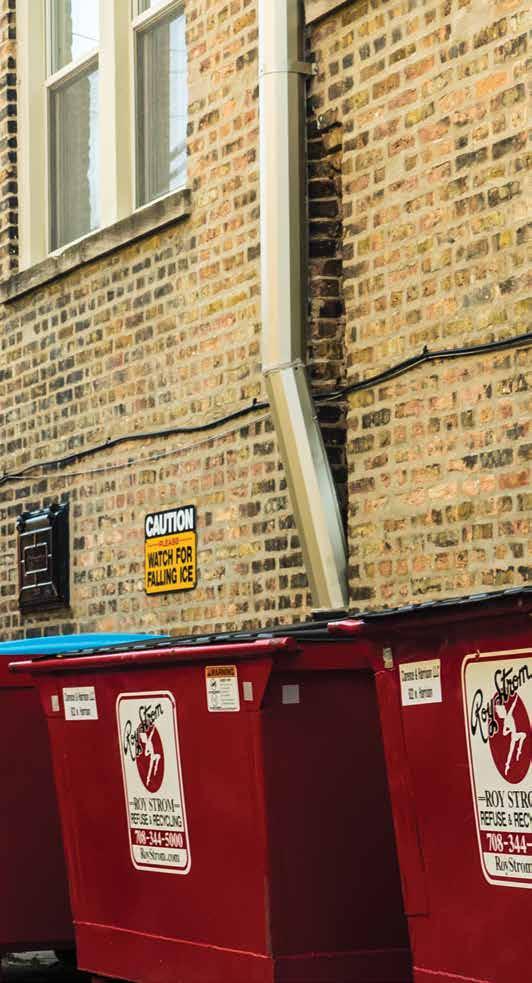
5 minute read
Roy Strom Refuse Removal Service


Advertisement


Boutique refuse service



Roy Strom and Mack bring white glove service to the curb


The refuse industry is a hands-on affair, and every customer has different needs. For the Roy Strom Refuse Removal Service in suburban Chicago, adapting to customer and municipality demands has transformed the business into a “boutique” waste hauler, says company Vice President George Strom.
Founded 75 years ago in Maywood, Illinois, Roy Strom has maintained its focus on fi guring out how to care for each customer, whether a township, apartment complex or corporation. A family- owned business, George is in the fourth generation of Stroms to deal with those challenges. Mack Trucks has been part of their operation since the start.
Roy Strom currently has about 100 employees total in its refuse and construction operations, and operates 45 trucks, primarily Mack® Granite®, TerraPro® and LR models with rear loader and rolloff bodies. The company has purchased only Macks since 2008.
“With the more this market gets segmented, how do we adapt as a smaller business to maintain the quality of service that we’ve always held?” George says. “Our industry sometimes gets cast as the people causing the garbage. We’re just moving it for people. But how can we play more of a part in helping with this waste problem that exists in our country?”
Boutique businesses are always on the lookout for new ways to serve their niche. For Roy Strom, that means being willing to do new things for customers. “Everything is customized to the individual municipality,” George says. This includes e-waste, food and yard waste pickup, as well as composting of biowaste. Their fl eet plays a critical role in meeting these challenges. “Throughout our whole history, Mack’s been the truck that we’ve relied on,” George says. “The truck has been a key part to dealing with the tough environment that we are in every day, including the challenging Chicago weather and the harsh waste environment. We know when we purchase a Mack it is going to last 10 to 20 years. We’re not switching,” he says. “We’re dedicated to Mack products.”
Reliability is important for refuse trucks. The duty cycle is severe and the consequences of mechanical failure while on a route are very public. No one wants a garbage truck stranded in their neighborhood on a hot day, while the pressures of keeping to collection schedules is intense. George says the fl eet has only had one engine failure in its history, and that was the fl eet’s fault. “My dad always said, ‘Mack motors are bulletproof.’”
Roy Strom does almost all of its own maintenance and has counted on Mack technical education for their technicians to stay on top of the latest technology. George says being able to diagnose issues remotely is critical for the fl eet. And having a standardized fl eet of Mack trucks helps with maintenance and with driver training and operations, since the fl eet slip-seats drivers.

“We like Mack for many reasons, including the reliability, customer service and parts availability. Our dealership, M&K Truck Centers, has been an excellent partner. They tend to keep several trucks in stock so that when we need a truck we do not have to wait to get the vehicle we need. They have a huge parts inventory, so we can get almost any part delivered to us the same day,” he says.
In Chicago, the size of the trucks is a big issue because of the alleys where many refuse collections occur, so trucks have to be spec’d and purchased based on where they will operate. To address this, the fleet worked with a refuse body company to develop split-bodies — rear loaders with both trash and recycling compartments. These are “great” in alleys, George says, and inflict less wear and tear on infrastructure, since the fleet only requires one pass instead of two.
Roy Strom uses technology to improve service and operations. They have installed tablets in almost all the fleet’s vehicles for routing, tonnage, customer information and photos. Drivers can also take photos whenever a bin isn’t out for collection when customers complain their trash wasn’t picked up. This is useful considering the fleet picks up at as many as 20,000 residences each week.
And George has his eye on some other new technology: electric-powered trucks, particularly the Mack LR Electric refuse truck which will begin testing with two fleets in 2020.
“I know it was just announced, but this electric Mack truck, I couldn’t be more excited about that.” He called his Mack sales representative the day he saw the initial announcement and thinks it would be “ideal” for communities that still have backdoor service. “It would be super green for a community that wants to be more green.”
That forward-thinking attitude is central to Roy Strom’s ability to grow and thrive for three-quarters of a century in a very competitive market.
“Attention to detail has been really critical to our success,” he says, an attitude that extends to equipment. “If a customer sees that you’re taking care of your stuff, they think you’re more likely to take care of them.” The fleet washes its trucks once a week, but some drivers take it a step or two further.
When a new truck came in a few years ago, its driver decided he wanted to wash it every night on his own time, George says. “The next new truck, that driver also did the same thing. Now, there’s a group of drivers who rinse off their trucks every night on their own time. Drivers tell me ‘I just take pride in my vehicle. I take pride in the way it looks.’
“Our sense of pride — my family’s sense of pride — in this company is why we continue to operate.”




